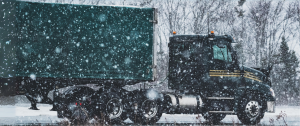
For many drivers, the best part about the trucking profession is the flexibility.
You can choose between OTR or local runs, team driving or remaining solo. Some drivers prefer to always carry certain freight, while some are flexible and like to switch it up. And, when it comes to scheduling, some drivers prefer to hit the road at night, while others prefer the daylight hours. It’s all part of the flexibility that makes trucking such an appealing profession for many.
However, every choice as a trucker has its benefits and drawbacks. Driving at night can save time, seem more peaceful, and get drivers back home by morning. However, there are also plenty of safety and logistics concerns to keep in mind with this unique schedule. Keep reading to learn the pros and cons of night driving and some essential safety tips to keep in mind before trying it out.
Why drive at night?
There are many reasons a CDL driver might choose to drive at night instead of during the traditional daytime hours. Some drivers are adamant that it’s easier, and many have been doing it for years so their bodies are used to the routine.
Other truck drivers might switch to a night schedule simply because of their employer. Many trucking companies like to keep their trucks running on a near 24-hour cycle to maximize returns, which means at least some of their drivers will end up with the night shift.
Sometimes night driving might just make more logistical sense, such as if you have an early morning pick-up or drop-off and you won’t make it without hitting the road before dawn.
Whatever the reason, it’s important to consider these pros and cons before making the switch to night driving.
What are the pros?
Traffic is usually much lower: One of the main reasons truck drivers prefer nighttime driving is the reduced four-wheel traffic on the roads during this time. With fewer passenger vehicles, truckers can navigate more smoothly and efficiently.
More off-duty parking options: Since overnight drivers complete their routes in the morning, when most other drivers are active, they have better access to available parking spaces at truck stops and rest areas.
Less-crowded truck stops: Truck stops tend to be less crowded during the night, allowing drivers to refuel, rest, and take breaks without the hustle and bustle of daytime traffic. This means decreased wait times at the showers, fuel islands, and more.
Less construction: Nighttime driving often means encountering fewer road work zones, which can be a significant advantage for truckers. Construction-related delays are minimized, allowing for smoother travel. However, keep in mind that sometimes major road construction and repairs do take place at night instead, so it’s important to remain vigilant.
What about cons?
Reduced visibility: Darkness makes it harder to spot obstacles such as other vehicles, wildlife, roadkill, or debris.
Increased wildlife movement: Wildlife tends to be more active during dusk, nighttime, and dawn. Truckers must remain vigilant for animals like deer, moose, and livestock that may venture onto the roads.
Poor road conditions: Winter nights can be particularly challenging due to icy roads and slower snow removal. Drivers must consider weather conditions and adjust their plans accordingly before each night time run.
Increased safety concerns: Overall safety concerns can be increased due to the nature of driving at night. It can be hard to adjust your body to driving at this time, so you must find ways to remain alert at all times. Drivers need to constantly scan their surroundings, avoid cruise control, and take breaks if feeling even a little drowsy.
Night driving safety tips
If night driving seems like the right choice for you, keep these tips in mind to ensure the safety of yourself and any other drivers on the road.
Frequently check lights: This should be part of any pre-trip inspection, but it is especially important at night. Avoid costly fines or worse by inspecting every lighting system on your rig, including the headlights, clearance lights, brake lights, marker lights, and overhead reflector.
Keep a clean windshield: This helps reduce glare from any other light source and increases visibility.
Remember high beams: It’s important to turn off your high beams whenever you see another driver on the road.
Drive defensively: You should constantly be on the lookout for wildlife, pedestrians, and drunk drivers.
Keep yourself awake: It can be difficult to avoid feelings of drowsiness while on the road, so use these strategies to keep yourself alert. Lower the temperature in your cab or roll down your windows to keep the air cold and moving. Listen to music or podcasts at high volume. Don’t eat a large meal before you leave, and try to nap during day time hours to adjust your body to the change of routine.
Remain aware of your surroundings: Another consideration for night driving is that some places just aren’t as safe at night. If you get out for a break or are dropping off a load, remain vigilant and aware of your surroundings. If you don’t feel comfortable, listen to your gut and don’t leave your cab. Circle the block and look for another spot, or just wait it out.
Truck driving at night has many benefits, but it also has a few important considerations. If you are thinking of switching to this schedule, be sure to get enough rest beforehand and don’t be afraid to pull over whenever you need a break.
For more information on trucking tips and tricks, be sure to stay up-to-date on our most recent Truck Driver Blog posts and follow us on social media.













